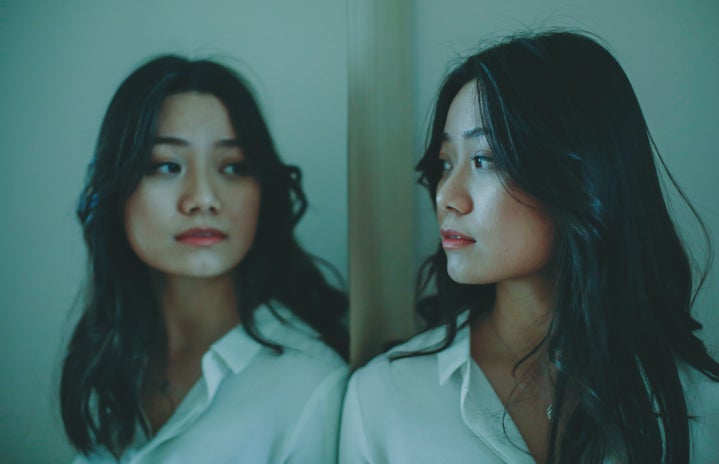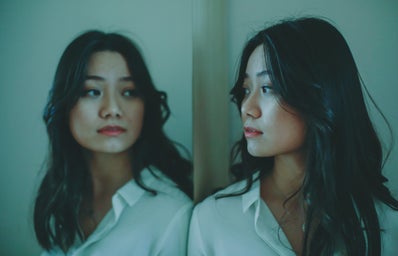“Male fantasies, male fantasies, is everything run by male fantasies? Up on a pedestal or down on your knees, it’s all a male fantasy: that you’re strong enough to take what they dish out, or else too weak to do anything about it. Even pretending you aren’t catering to male fantasies is a male fantasy: pretending you’re unseen, pretending you have a life of your own, that you can wash your feet and comb your hair unconscious of the ever-present watcher peering through the keyhole, peering through the keyhole in your own head, if nowhere else. You are a woman with a man inside watching a woman. You are your own voyeur.”
– Margaret Atwood.
I find myself thinking about this quote by poet, activist, feminist, and author Margaret Atwood on both the best and worst of days. Learning about the internalized male gaze, and how it plagues the lives of all women is enlightening yet horrifying. It is inescapable in the happiest and saddest of moments, the healthiest and most toxic of relationships, and the conscious and unconscious moments of simply being. Being born female and growing from a baby girl to a young lady to a woman means to be constantly watched for your presentation, either idealized or discarded by not only male peers, but by yourself.
I first found myself noticing this unsolicited voyeurism in early college, although I soon realized that it had been present within me for almost my whole life. It took male attention in a more romantic sense to exacerbate my inclination to perform for the enjoyment of others, and for me to realize that this has been a part of me my whole life. When I walked around campus, I felt the need to look just the right amount presentable, so that I was noticeable in a way that came off as “effortless”. When writing notes in class or the library, I automatically found that I rested my chin in my hand, like the girls in teenage rom-com movies who always attracted the perfect suitor, who thought she was perfect–everything he could ever want. Even in my own room, occasionally, I’ll sit gently reading a book as if I was being filmed or viewed, despite knowing that I am alone. We all do this, to some degree. The whole notion of acting like “the main character”, aside from exerting our own confidence, is an act of adhering to the male gaze, whether internal or external.
So, what is the male gaze, exactly? According to theorist and filmmaker Laura Mulvey, it is the notion that the world has been “split into the active male and the passive female”, and that women intrinsically take on the supporting role to male protagonists, who view the world in a way that both sexualizes women and empowers themselves. The “internal male gaze” stems from the way we have been conditioned, as women, to believe that our only appeal in society is our sexuality and what can be “given” to men to help empower them, thus creating the habit of acting and reacting as though a man is constantly viewing us, despite being aware of there being a real viewer or not.
The male gaze is sometimes a bit hard to explain, especially to those who are unaware of the ways it personally affects them. It may even sound a bit crazy–like women are so obsessed with attention from men that they imagine men viewing them at all times. However, it is important to note that acting within the male gaze is almost always unconscious, and is heavily conditioned in women since childhood. It’s in the way we, as women, want to seem like the “chill girlfriend”, someone’s “dream girl”, or simply desirable to passerby’s. It’s in the way we find normalcy in television slow-pans over a woman’s body, or in the way we just can’t help feeling a little bit sad for hopeless-romantic Tom in 500 Days of Summer when realist Summer breaks up with him. It’s in the way that if a girl comes to class dressed up, we assume there’s a guy that she is trying to impress, or that she is going on a date with her boyfriend right afterward. It’s everywhere, in the sense that women are not to exist if not for the pleasure or company of a man.
One of my favorite references to the male gaze–and becoming aware of it–comes from Gillian Flynn’s “Cool Girl Monologue” in her bestselling novel, “Gone Girl”. According to Flynn, the “cool girl” is “above all hot”. She is desirable in the way that she is different from the other prissy sensitive girls that guys simply don’t want anymore. She is never angry. She “smiles in a chagrined, loving manner and lets men do whatever they want”. She is “basically the girl who likes every f*cking thing he likes and doesn’t ever complain”–she’s a dream girl, even though she has unauthentically molded her personality into being exactly everything a man could ever want. Finally, to the likely surprise of men everywhere, the “cool girl” does not even exist in actuality. Because, in the end, men who are dating the “cool girl” are actually just dating a woman “who has watched too many movies written by socially awkward men who’d like to believe that this kind of woman exists and might kiss them”–who have learned that this is what men want, and created herself to be just that.
Through much of my time in both past relationships and “talking stages” I definitely fell into the “cool girl” trap. I thought that there would be nothing better than to be someone’s muse, in retrospect. I wanted to be perfect for somebody and didn’t care if I subconsciously altered my personality to achieve that. I don’t blame myself, either, as it is almost impossible to avoid the constant pressure from society in adhering to the qualifications of the “perfect woman”: don’t spend too much time on your appearance, but put in the effort. Be interesting, but only in a way that a man can relate to and understand. Be just sexually willing enough for you to not be seen as a slut or a prude. Be willing to put your own needs aside, as long as your man is happy. They are all disgusting and degrading ideals, yet ones so many of us fall into unconsciously and almost fearfully– “it’s either this, or I will be all alone.”
To (probably) nobody’s surprise, becoming complacent and a supporting character to a male’s leading role does not work in any kind of relationship. I always knew that underneath layers of insecurity and societal pressure, I was strong, self-assured, and most of all, rightfully angry. And, eventually, any internally strong woman pretending to be the “cool girl” will crack–her opinions, confidence, and oh-so-scary self-empowerment flowing to the surface in the form of standing up for herself, saying “no”, and simply displeasing a man for the sake of her own sanity. And, in turn, men will hate them for it, unused to being challenged or simply not being catered to with fragility. After recognizing this, I could check myself and my interactions to see if they fell into the trap of either me adhering too far into the male gaze, or someone idealizing me into a persona of which I knew I would never be able to keep up. I’ve had men I’ve talked to but two times tell me I reminded them of a manic-pixie-dream-girl type song, such as “She Makes Me Laugh” by The Monkees. I’ve also had men I hardly knew tell me I’m “not like the other girls” countless times because I’m not in a sorority and listen to “indie” music. Though they were meant as the type of compliments that a female love interest of a male hero in a film would simply eat up, they did not make me feel very good.
Instantly recognizing these men as the ones who have watched one too many coming-of-age movies about a boy who finds a girl who perfectly mirrors his every wish, and taken them all way too literally, I ran for the hills. Likewise, I found out how to recognize when I began to idealize someone and put them on a pedestal. I once felt as if I had to climb in order to be on their level through references to their favorite shows I’ve never watched, or pretending to be un-phased by offensive jokes. Through simply being aware of my bad habits, I was able to stop myself and walk away. In turn, I found myself in the best relationship I could have ever asked for, all because I threw out my ideals of what I “should be” in order to be desirable, and instead said, “Here I am. If you don’t enjoy it, then leave”. This derived from the recognition of the male gaze, in my archetypes of what life and love should be. I am a work in progress–it takes years to unlearn something surrounding you constantly. But, through consciousness, I believe that we can all begin to recognize our internalized male gaze, our own voyeurs.


